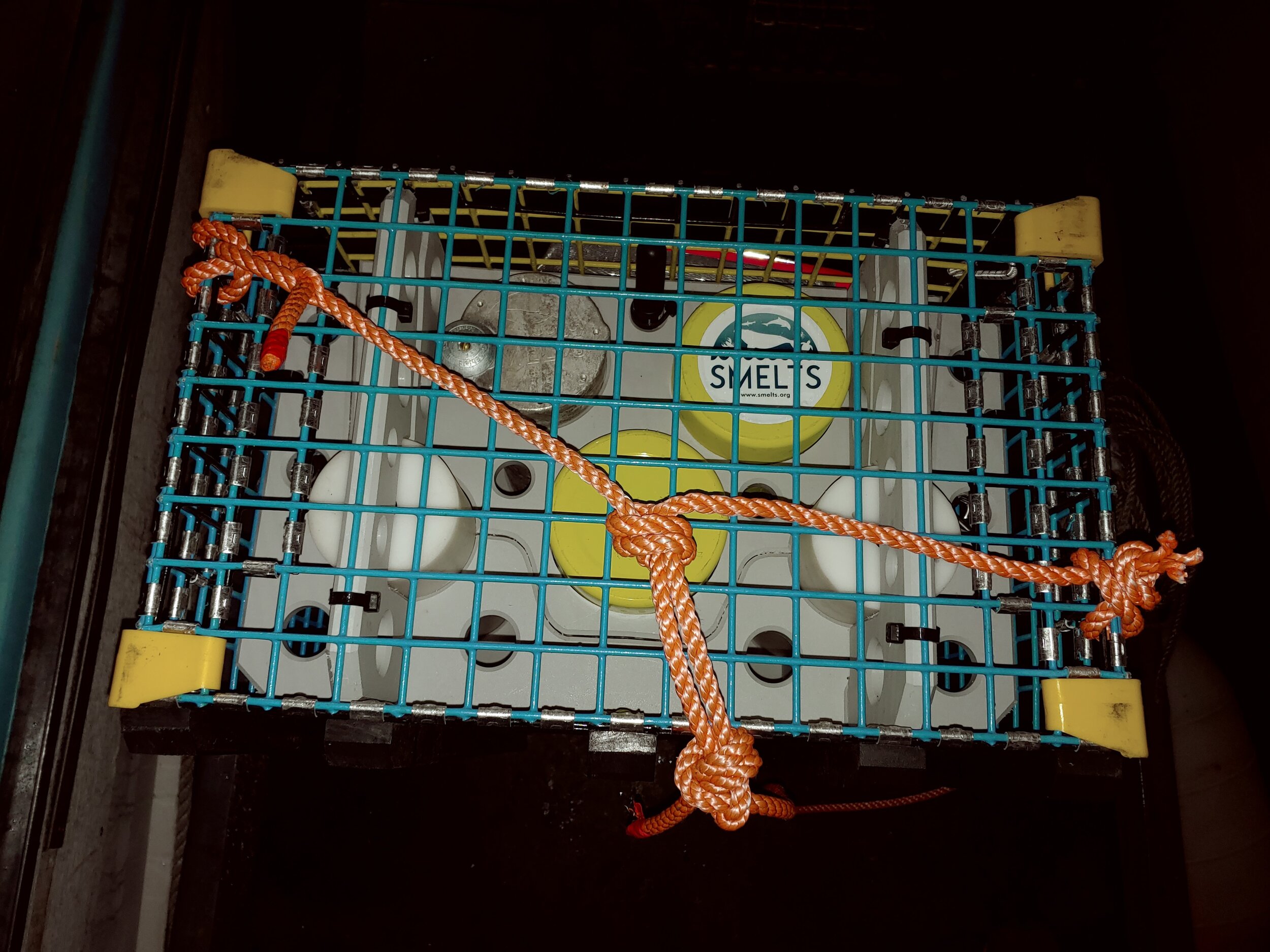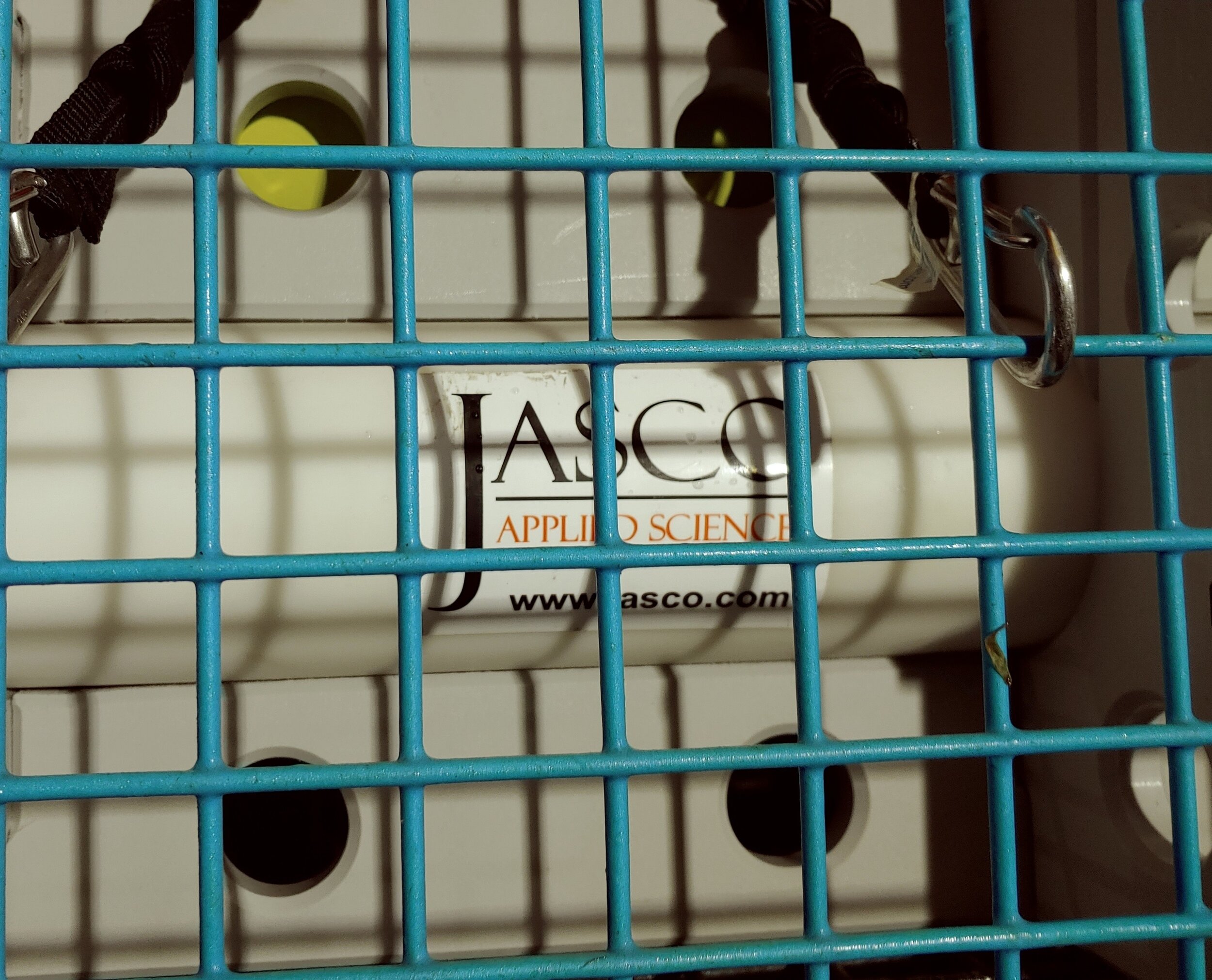JASCO Applied Sciences has teamed up with SMELTS (Sea Mammal Education Learning Technology Society), a non-profit developing new solutions for commercial fishing that reduce or eliminate the risks of whale entanglement and ghost gear. Together they deployed the first ‘Ropeless Whale Recorder Raft’.
The JASCO-SMELTS Whale Recorder Raft, is a ropeless lobster trap system that could eliminate marine entanglement and reduce ship strikes.
The JASCO-SMELTS Whale Recorder Raft incorporates:
JASCO’s AMAR (Autonomous Multichannel Acoustic Recorder) to record acoustic data.
Inflatable lift-bag technology to float the raft for retrieval and lobster harvesting.
The raft is identical in design to the lobster traps already used in the industry, but in place of ropes and surface buoys that can entangle whales, it uses ropeless inflatable lift-bag technology for retrieval. The bags’ buoyancy efficiently and reliably brings the gear to the surface for recovery—triggered by a timer or an acoustic signal. It is the latter feature that inspired the thought of using the SMELTS lobster trap raft as a carrier of opportunity for JASCO’s advanced underwater sound recording and analysis instruments.
“The need for ropeless traps in the lobster and crab fisheries is well understood and interest is growing. Ropeless traps are typically triggered acoustically for recovery. Fitting these traps with a more sophisticated acoustic system that can also record sound, detect marine life, and communicate those detections to stakeholders seems like a natural evolution. JASCO is pleased to be helping SMELTS demonstrate the feasibility of this exciting concept.”
The JASCO-SMELTS Whale Recorder Raft, which incorporates JASCO’s AMAR G4 ACE, was deployed May 13 2021 off Stellwagen Bank National Marine Sanctuary, located east of Boston, Massachusetts, between Cape Ann and Cape Cod.
Sixty days later the recorder was retrieved from the raft and returned to JASCO for data analysis. During this time underwater, punctuated by brief resurfacing cycles every few days for catch harvesting, the raft operated as a normal lobster trap, catching what the fishers jokingly refer to as “acoustic lobster”. It also captured underwater sounds including marine mammal calls and noise from vessels.
Sounds like a happy humpback whale!
AMAR records whale calls and other underwater sounds while deployed on the ropeless raft system.
For Captain Richard Riels, Executive Director of SMELTS, a keen interest in marine life and animal welfare began at a young age. Growing up fishing and whale watching with his step-grandfather, who was a lobster fisherman, this passion propelled him to volunteer with the Marine Mammal Health & Stranding Response Program in Washington State. He then completed his whale disentanglement training at the Center for Coastal Studies. Finally, Richard began applying his engineering background to alleviating the deadly problem of marine mammal entanglement. This is what led to the Ropeless Raft concept, which not only wards off direct entanglements in lines but also eliminates a source of “ghost-gear” hazards for marine life by preventing individuals from cutting surface floats.
“I wanted to work with people on the water instead of being behind a desk. The earth is an incredible place and I’m trying to help look after it, the best that I can. This technology has the potential to draw a younger generation who have grown up in a fast-paced, tech world, and entice them to take part in improving 200-year-old fishing methods to protect marine life.”
While the Whale Recorder Raft project feels like the culmination of a journey for Captain Riels and his team, he acknowledges that it’s only the beginning for this innovative fusion of technologies. The Whale Recorder Raft opens possibilities for fishers to become “community scientists”, collecting important information from the ocean as they go about their work. The recording Rafts could eventually evolve into a distributed and networked system capable of warning mariners of the presence of whales to reduce ship strikes and interference with the animals’ behaviour.
The Whale Recorder Raft brings a scientific twist to lobster fishing, combining the collection of valuable ocean data with a traditional sea harvesting activity and enabling both to be done safely for the environment, even when whales are present. The fishers involved in the Ropeless Raft pilot program are excited at the opportunity to do something that benefits the ocean while they learn new techniques in their craft. With more awareness and support from the scientific community, synergetic technologies like the Whale Recorder Raft could bring about significant positive change in the fishing industry and marine mammal conservation.
SMELTS is a non-profit committed to creating marine mammal interaction prevention technologies. Their focus is on eliminating entanglement in active fishing gear of large whales, pinnipeds, endangered sea turtles and basking sharks.
They are also invested in the reduction of bycatch from abandoned, lost, derelict fishing gear. They strive to educate the community on human interaction with sensitive groups of at-risk species.









